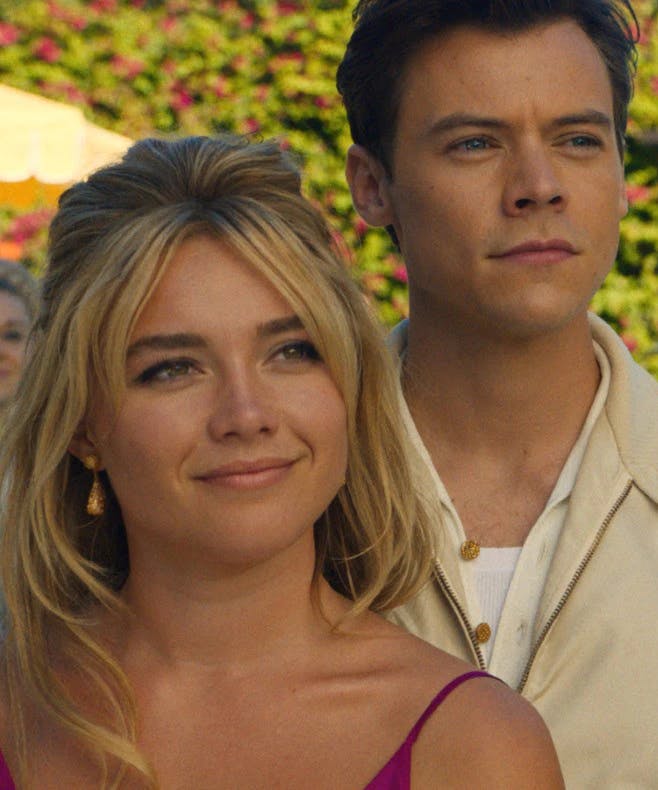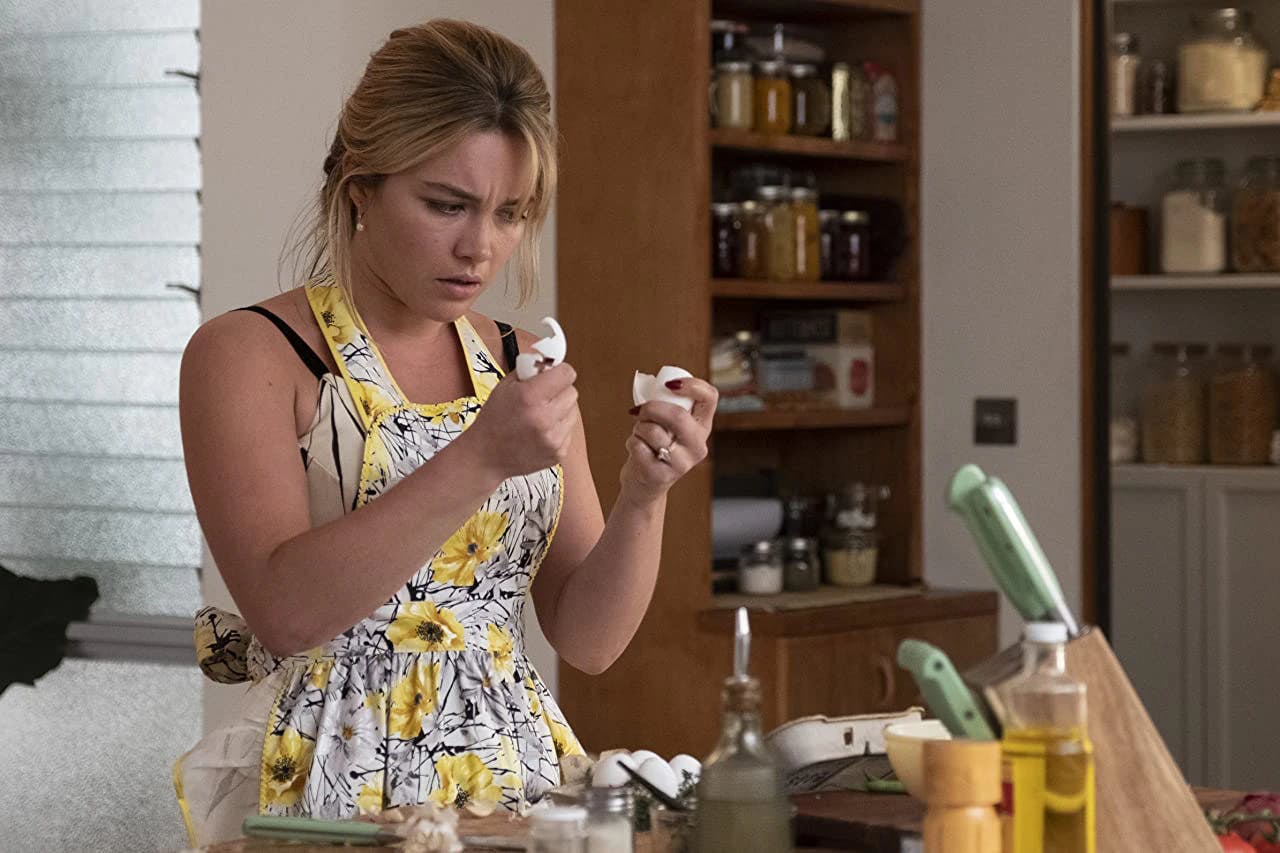What Olivia Wilde’s ‘Don't Worry Darling’ Gets Wrong About Masculinity
Unless you’ve been living under a rock since late August, you’ve heard of Olivia Wilde’s psychological thriller “Don’t Worry Darling.”

From the behind-the-scenes drama surrounding Wilde allegedly cheating on Jason Sudeikis with Harry Styles to her alleged feud with Florence Pugh, most of the attention the movie has received has nothing to do with its content. Many went to the theater just to see the movie that produced so much drama and to support the amazingly talented Florence Pugh, but with little to no knowledge of the plot.
The trailer makes the movie look like a psychological thriller that’s similar to The Stepford Wives blended with The Matrix, but didn't provide many plot details. It also went viral when director Olivia Wilde said that she based the movie's villain on Jordan Peterson and referred to him as an “incel hero,” which is only funny because it doesn’t make any sense.
Though I enjoyed the movie for its aesthetic and thought Florence Pugh was phenomenal (Chris Pine and Gemma Chan also gave great performances, but they’re barely in the movie), I can’t get over how flawed the movie’s message on masculinity was.
*Major spoilers ahead*
Olivia Wilde Claims the Movie’s Villain Is Based on Jordan Peterson
Before the movie was released, Wilde said that the movie’s villain, Frank (Chris Pine), was based on famous clinical psychologist and author Jordan Peterson. Wilde said, “We based that character on this insane man, Jordan Peterson, who is this pseudo-intellectual hero to the incel community. [Incels are] basically disenfranchised, mostly white men, who believe they are entitled to sex from women, they believe that society has now robbed them – that the idea of feminism is working against nature, and that we must be put back into the correct place.”
Wilde continued, “They’re actually succeeding in many different ways. But this guy Jordan Peterson is someone that legitimizes certain aspects of their movement because he’s a former professor, he’s an author, he wears a suit, so they feel like this is a real philosophy that should be taken seriously.”
The problem with this statement and narrative is that anyone who has ever read Peterson’s work knows that this couldn’t be further from the truth about what Peterson stands for. Though I don’t agree with everything Peterson says, I’ve read much of his work and know that he is an advocate for individualism, personal responsibility, and mental health, especially when it comes to young men. In a culture that demonizes masculinity (whether it's healthy or not), a public figure like Peterson who advocates for healthy masculinity should be a good thing, but the media (and Wilde) have been quick to label Peterson as someone akin to Andrew Tate. Ironically, one of the main things Peterson advocates for is for young men to take personal responsibility and stop blaming the world for their problems, which is the antithesis of what incels stand for.
Peterson’s catalog of work is massive. Though his lectures on The Gulag Archipelago and Fydor Dostoyevsky are a must-watch for everyone, I’d recommend reading some of his books like 12 Rules for Life: An Antidote to Chaos and Beyond Order: 12 More Rules for Life, as well as some of his guest interviews on podcasts like The Roommates and The Joe Rogan Experience.
Peterson actually spoke out against the incel community during a July 2018 appearance on The Joe Rogan Experience. When asked how he felt about being branded as an inspiration for incels (this isn’t a new or unique critique of Peterson’s work), he said, “It’s ridiculous. One of the things I’ve said continually, and this is on record in multiple places, is that if you’re a young man, and all of the women are rejecting you, who’s got the problem? It’s not all of the women. That’s a bad road to go down. If all of the women are rejecting you, it’s you.”
It could just be me, but it sounds like that statement goes completely against what incels are, especially how Wilde describes incels. Don’t get me wrong, there are incels who spread misogynist rhetoric online, but Peterson isn’t one of them. Wilde either didn’t do her research on who Peterson is or willfully ignored the truth because it benefited the message of the story she was trying to tell. Though she has every right to tell the story she wants and to insert her political and social views into her work (this is America, after all), her work is a perfect example of what happens when our culture confuses healthy masculinity with toxic masculinity, and demonizes all masculinity in the process. This is not only confusing for society but a complete lie.
What’s Don’t Worry Darling About?
Don’t Worry Darling follows Alice (Florence Pugh) and Jack (Harry Styles), a young married couple who live in the idyllic desert town of Victory in the 1950s. Jack works as a technical engineer developing “progressive materials” (which purposely makes no sense) for the Victory Project while Alice stays home. During her day, Alice cooks, cleans, socializes with her fellow housewife friends, goes to the community pool, takes ballet classes, and shops. Their lives are seemingly perfect, but it’s clear to the viewer that everything is not what it seems.

One of Alice’s friends, Margaret (Kiki Layne), recently had a mental breakdown and throws a fit at a party hosted by Jack’s boss, Frank, and his wife, Shelley (Gemma Chan). Alice discusses her concerns about Margaret with her friend Bunny (Olivia Wilde), who brushes off Margaret’s behavior because she broke the one rule of the community, to not visit the headquarters of the Victory Project. Shortly after the party, Alice starts to see through the cracks of her seemingly perfect life, and she’s shocked to witness a plane crash on her way home from shopping one day. She goes to investigate the crash, only to find that it was near the headquarters of the Victory Project. She passes out and finds herself asleep at her home while Jack cooks dinner, insisting that there was no plane crash.
Shortly after the plane crash incident, Alice has visions of Margaret hurting herself and runs home to watch Margaret slit her own throat on her roof, falling to her death. Alice sees men in red suits come to take Margaret’s body away, and they also remove Alice from the scene.
Alice is visited by the town doctor, and he and Jack insist that Margaret is fine after she fell in her kitchen. When Alice tells them that she saw Margaret take her own life, they insist that she was hallucinating. The doctor prescribes medicine to Alice, which she refuses to take. As more time passes, Alice realizes that she has little to no memory of what her life was like before she moved to Victory and that many of the women in the town have identical backstories. She believes that Frank is up to something sinister, leading her to confront him at a dinner party.
After she confronts Frank at the dinner party, she begs Jack to escape Victory with her. Jack agrees, but the same men in the red suits who took her away from Margaret’s suicide take her to a hospital to recover from her seemingly hysterical episode. Alice returns home happier than ever after treatment, but it takes Jack humming an old song for the truth (and the twist of the movie) to finally be revealed.
The town of Victory is an illusion. In real life, it’s present-day, and Alice is a doctor, while her husband Jack had just lost his job. Though they agree to get through it as a couple, Jack grows resentful of Alice’s role as the breadwinner, and Alice is miserable with her failing marriage and lack of work-life balance. After discovering Frank’s lectures online, Jack applies to join the Victory Project, a virtual reality experience based on a 1950s-style utopia. He drugs Alice (without her consent, obviously) to join the Victory Project with him and leave her entire life behind to become a 1950s housewife. The truth behind Jack’s job is also revealed – when the men of Victory go to work, they reenter the real world to work and pay for their stay in Victory.

After learning the truth, Alice confronts Jack and accidentally kills him in a fit of rage. Bunny discovers the scene of the crime and tells Alice that she’s known the truth behind the Victory Project all along and that she and her husband chose to join because they couldn’t live in the real world after the death of their children, but none of the other women know the truth behind Victory. She tells Alice that men who die in Victory die in the real world as well, urging Alice to run away. After an extensive car chase, the screen fades to black, insinuating that Alice escapes Victory.
Branding Masculinity As Toxic Demonizes Healthy Masculinity
Though I enjoyed watching Don’t Worry Darling and thought Florence Pugh’s performance was outstanding, I couldn’t get past its flawed message on masculinity and the many plot holes (which most critics agree with) of the movie. If Chris Pine’s character, Frank, was truly based on Peterson and his work, then Jack, as his follower, would probably develop a fascination with Russian literature, put in extra work to find a new job, and improve himself to improve his relationship with Alice. But since Frank is actually a psycho cult leader created in the minds of Wilde and screenwriter Katie Silberman, none of this happens. Instead, Jack literally kidnaps Alice and forces her to live in a simulated reality where he’s the breadwinner.
It seems that Wilde was trying to paint a portrait of the dangers of toxic masculinity, but if this was her message, then she failed miserably. Wilde seems to equate masculinity with wanting to control women and keep them at home and out of workplaces, apparently to prevent them from thinking or acting or making money for themselves. Since the majority of women in Victory are there against their will, Wilde implies that their roles as housewives and mothers are oppressive. Though their lives in Victory are oppressive, it’s because they’re forced to be there and manipulated to unconsciously play along, not simply because they’re wives and mothers. Feminism is supposed to be about gender equality and women choosing the direction of their lives (which is a wonderful thing), but many modern feminists demonize masculinity and women who want to embrace more traditional roles like motherhood and being stay-at-home moms. Choosing to become a wife or mother doesn’t negate your value, your thoughts, or your agency, and it certainly doesn't mean you're oppressed.

Wilde attempts to paint traditional gender roles as oppressive, but the true oppression in Don’t Worry Darling is how the men in Victory want to control women so much that they trick them into living in a simulation with them. Masculinity that uses control, deceit, and manipulation to manage a relationship is truly toxic, even abusive. Healthy masculine men don’t want to control their wives, and the theme of control would be just as messed up if it were the women doing it to the men. The true enemy in the movie isn’t the patriarchy or traditional gender roles, it’s control, manipulation, and the authoritarian qualities a cult-like leader possesses.
Furthermore, Wilde doesn’t include any positive examples of masculinity, implying that she believes the only form of masculinity is toxic masculinity, where men love to control and oppress women. Branding all masculinity as toxic is not only lazy and false, but it demonizes healthy masculinity. True masculinity is about strength, respect, leadership, sacrifice, and protecting those who are most vulnerable. This is why men traditionally went off to fight in wars while women stayed at home with children, because it was up to the men to protect their families and fight for freedom. Though gender equality is a great thing, and it’s a good thing that we’ve progressed to the point that men and women have equal opportunity, that doesn’t make traditional masculinity – or traditional femininity – any less virtuous.
Closing Thoughts
If Olivia Wilde was trying to send a message about toxic masculinity and the oppression of traditional gender roles in Don’t Worry Darling, she missed the mark. Though the movie is enjoyable, it’s clear that Wilde cared more about demonizing masculinity, traditional gender roles, and Jordan Peterson than creating a cohesive narrative, leading to many plot holes and a missed opportunity to discuss the authoritative nature of cult-like leaders.
Don’t miss anything! Sign up for our weekly newsletter and get curated content weekly!